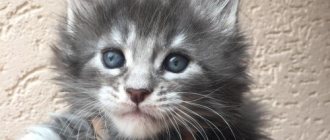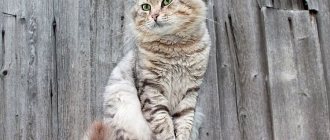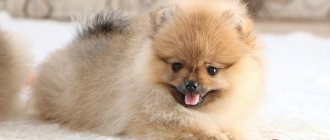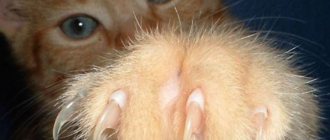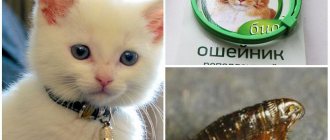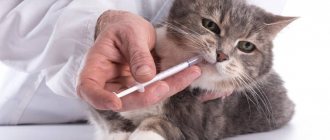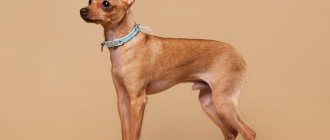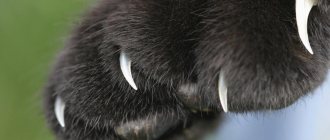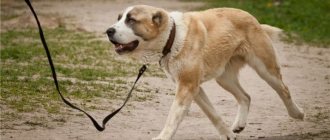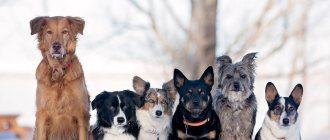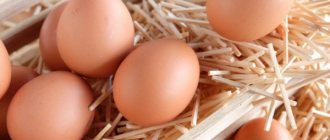Adult Maine Coons are famous for their large size and considerable weight for a domestic cat. And many people who have only recently become owners of babies of this breed are perplexed when looking at their funny, playful and still very small pet. Will he, too, someday turn into a huge, important and at the same time graceful cat? How do kittens grow and what factors can influence the size they eventually reach when they finally become adults?
Factors influencing growth
- Floor. Boy kittens grow faster than girl kittens and, as a result, when they finally mature, they reach larger sizes than their sisters.
- Genetics. Kittens from large parents are born with greater body weight and, as a rule, also grow up to be as large as their relatives.
- Physical condition of the newborn. Babies born weaker gain weight less quickly.
- Large litter size. Kittens from small litters are born larger than kittens from larger litters.
- Maintenance of mother kittens during pregnancy and while feeding offspring. If a mother cat eats properly and is kept in good conditions, then she produces healthy and strong offspring, which is the key to good growth and weight gain in babies.
- Stress. If there is a turbulent atmosphere in the house where the pet is growing up, if the owners are arguing, starting renovations, or something else is happening in their family that disrupts the usual rhythm of life in the house, then the kitten will gain weight worse due to strong worries.
- Past illnesses. Kittens that have recovered from the disease grow worse, and their growth may stop altogether for some time.
- Feeding. In order for a pet to grow well, it must eat properly and nutritiously.
Heredity depends not only on the mother of the kittens, but also on the father, so from different cats the same cat can produce offspring of different sizes.
Genetic factors
Let’s immediately say once again that this is a rather unusual cat - a Maine Coon. Kittens grow and develop depending on their weight, determined by the characteristics of the breed. The greater the weight according to breed characteristics, the greater the growth rate of the animal.
The second reason why the weight of a Maine Coon varies from month to month is gender. For example, by 3 months, males gain much more weight than females.
The third factor can be called the weight of the mother cat. This parameter depends on the genotypes of the parents. The larger and physically healthier the cat, the faster the kittens will grow.
Individual genetic characteristics. Any combination of parental genotypes leads to the emergence of a unique, new organism. This is manifested in the development of the muscular and skeletal systems, as well as in the growth rate of kittens.
Hormonal factors. This refers to the use of various hormonal drugs prescribed for therapeutic purposes. Uncontrolled use of this group of drugs or changes in prescribed dosages may disrupt the imbalance in the kitten’s endocrine system, which will subsequently negatively affect its growth and development.
Kitten development
During its maturation, a growing kitten goes through four stages of growth:
- Neonatal period. This is also the period of the newborn. It usually lasts 4 days. During this time, the daily weight gain of the cat's cubs depends on how easy their mother's birth was.
- Suction period. Lasts 1 month. During this time, kittens, on average, gain from 20 to 50 grams of weight daily.
- Transition period. It begins from the time the cat cubs begin to eat a little on their own and continues until about one and a half to two months (7-8 weeks of life). At this time, the rate of weight gain slows down somewhat.
- After the suckling period. The kittens are weaned from their mother, the cat, and feed completely on their own. They begin to gain weight and height again quite quickly. This stage lasts from approximately one and a half months until the little Maine Coon becomes a full adult.
Cats of this breed mature and gain weight until about the age of three.
They also grow up to the age of 3 years. It is during this period that physiological and psychological maturation occurs, as well as puberty. For about another year or two the cat will continue to “matrate.”
Muscle mass will increase, he may gain a little weight, and his chest will expand. At the age of 4–5 years they are active and full of energy.
What to feed at 4 months?
Let us immediately note that it is very important not only what you fill the Maine Coon’s plate with, but also how many times a day you do this. We can say that the age of four months is a kind of turning point for a kitten. And all because at three to four months he needs five or six meals a day , and at four to six months - no more than four times. Therefore, at this age, pay more attention to your little Maine Coon: make sure that he is not hungry, but you should not overfeed him.
© instagram.com/o_s_t_r_o_v_s_k_a_y
Well, now we will tell you about how and what to feed Maine Coons at 4 months. His diet must certainly contain the following products:
- Meat. The Maine Coon will eat rabbit, beef, and chicken well. But you should not give pork, as it is too fatty.
- Offal. When selecting offal for your pet, put the lungs in the far corner - it is better not to give them to a small Maine Coon.
- Fish. Fluffy is very whimsical about this type of product. Only sea fish is suitable for it.
- Eggs. They do not need to be included in the diet too often. And it’s better to separate the protein from the yolk, since your cat will obviously not be happy with the protein.
- Vegetables and fruits. They are rich in vitamins, but the Maine Coon may be quite reluctant to eat them. Then mix vegetables with meat - in this case, the kitten will eat everything.
- Fermented milk products are necessary because they contain calcium.
- Water. Make sure that there is always clean and fresh water in the kitten's bowl.
- Vitamins. If you find it difficult to choose the right vitamins yourself, consult your veterinarian.
If you do everything correctly, the kitten will grow quickly and delight its owner every year of its life.
Mass table by month
| Kitten age | Cat weight (in grams) | Cat weight (in grams) |
| 1 month | 630 - 750 g | 560 - 680 g |
| 2 months | 1230 - 1500 g | 1150 - 1400 g |
| 3 | 1800 - 2300 g | 1700 - 2300 g |
| 4 | 3000 - 3800 g | 2700 - 3600 g |
| 5 months | 3200 - 5500 g | 2900 - 3900 g |
| 6 | 3900 - 6500 g | 3200 - 4000 g |
| 7 | 4200 - 6500 g | 3500 - 4300 g |
| 8 | 4500 - 6900 g | 3800 - 4300 g |
| 9 | 5000 - 7000 g | 4100 - 5000 g |
| 10 | 5200 - 7500 g | 4200 - 5500 g |
| 11 | 5700 - 8000 g | 4300 - 6000 g |
| 1 year | 5700 - 9000 g | 4500 - 6300 g |
| 1.5 years | 6000 - 9500 g | 4500 - 6500 g |
| 2 years | up to 10,000 g | 4500 - 7000 g |
| 2,5 | up to 12,000 g* | 4500 - 7200 g |
| 3 | up to 13,000 g* | up to 7500 g |
* Up to 12,000 - 13,000 g - the weight of adult castrated cats.
What to do if the kitten is not gaining weight?
If the kitten has stopped gaining weight, first of all, you need to find out the reason why this is happening. If a slight weight gain is associated with improper feeding (possibly from the breeder), then the new owner of the furry baby needs to take the following measures:
- Add more high-calorie foods to your pet's food, and also increase the amount of animal proteins.
- If your pet eats ready-made food, then you can try to switch it to food richer in proteins and higher in calories, preferably of a better class than the previous one.
- Start giving your pet vitamin and mineral supplements (preferably complex ones, which contain the entire necessary set of microelements).
Without consulting a veterinarian, you should not give your kitten biologically active additives to increase appetite or, especially, drugs that artificially increase body weight.
Also, in all cases, if a kitten’s poor weight gain is not related to nutrition, but to reasons other than genetic, it makes sense to take the pet to a veterinary clinic for a consultation and examination.
Feeding kittens with prepared food
Feeding your pet prepared food has many benefits. In particular, it makes it easier to choose the right diet and relieves the owner of the need to prepare food for the cat. However, the following recommendations must be observed:
- The food should be appropriate for the age of the kitten and, if possible, the breed.
- It must be of high quality - no lower than premium class.
- For the first time after arriving in a new home, the kitten should eat the same as in the breeder’s home. If he ate ready-made food, then you need to try to find exactly the same one and feed the baby with it.
- Transfer to another food can begin after the period of adaptation to the new home has been successfully completed. At the same time, you cannot immediately transfer the Maine Coon to a new food; the transition should be carried out gradually.
- You cannot combine feeding with prepared food and natural food. The kitten must eat one or the other.
- Up to 1.5 years of age, the pet can be fed with dry food for kittens; later, it is recommended to switch the Maine Coon to food designed for adult animals.
It is necessary to strictly follow the daily quantity and serving size recommended by the food manufacturer.
Overweight and underweight
If a Maine Coon has an average weight, this is an indicator of its harmonious development. However, some owners make the mistake of overfeeding the animal in an effort to raise a “record holder”. An obese Maine Coon, like any living creature, will soon develop health problems that can lead to early death.
We invite you to familiarize yourself with: Analysis of the dynamics of livestock development, Dynamics of livestock and poultry, Analysis of the productivity of livestock and poultry in the Blagoveshchensk region
In this case, you need to show your pet to a veterinarian. If there really is a problem, he will help determine its cause and prescribe appropriate treatment. It is important to track the development of small Maine Coons month by month. If the size and weight do not correspond to the age of the kitten, you need to review its diet and, if necessary, add more high-calorie foods, vitamins or nutritional supplements to stimulate appetite.
One of the reasons for excessive thinness may be a disease (for example, worms). If, after a certain time after changing the diet, the Maine Coon still does not gain the required weight, it should be shown to a specialist. If symptoms such as lethargy and depression, dull coat, etc. are observed, a visit to the veterinarian should be made immediately. You can also keep a chart of the Maine Coon's growth by month - body length and height at the withers should increase in proportion to body weight.
Complications from overeating
Overeating is not good for your cat. It leads to obesity and related diseases. An overfed pet may develop heart, liver, lung, stomach or intestinal diseases. Diseases of the musculoskeletal system may also appear, which negatively affects the activity and general well-being of the cat. Overeating and excessive weight gain contribute to the likelihood of developing cardiomyopathy, dysplasia or spinal muscular dystrophy, to which representatives of this breed may already be predisposed.
The maximum weight that a healthy, non-obese and uncastrated cat can have is 10 kg.
How much do Maine Coons weigh: table
Unlike other breeds, Maine cat kittens are born large. The average weight of a newborn Maine Coon is 130-145 g. But it can be 100 or 200 - it depends on the number of cubs in the litter. Usually 4-6 kittens are born, rarely 1-2 or 7. So, for example, if there are 7 kittens in the litter, then the average weight of each baby is 115 g, if 4 - 125 g.
This is still more than the indicators of other breeds:
- Norwegian forest – 110 and maximum 150 gr.
- Persians – 60-120 gr.
- Siamese – 60-130 gr.
- British - 100, maximum 140 g.
The little Maine Coon kitten is growing quickly. In the first week he doubles his weight. If development proceeds correctly, then the daily normal increase in body weight is 10%.
By 10 days of age the weight increases by 2.5-3 times, by 1 month by 5-6 times, by 2 months by 8-10 times.
Description of the breed
Large Maine Coons have a large body, wide neck and chest. The length of the tail of an adult animal is equal to half the length of the body. It is covered with long and thick hair. The head of this animal is large, the ears and cheekbones are high, the chin is pronounced, and there are often tufts on the ears.
The Maine Coon breed compares favorably with other felines with its large and very expressive round eyes. Their color can be yellow, amber, green or golden. Blue or cyan color is acceptable, but only for white cats.
Cats have thick hair that flows along the body, longer on the back, sides and belly. It is much shorter on the head and shoulders. The color can be any. Breeders managed to develop various shades and color combinations.
As already mentioned, there is a misconception that these beauties can reach gigantic sizes (up to 15 kg, and some indicate a weight of 25 kg). In fact, the weight of a healthy animal of this breed is no more than 12 for males, and females weigh about 8 kg. The growth of cats is usually measured not in height, like other animals, but in length. On average it reaches 100 cm.
There are many characteristic signs by which Maine Coon animals can be distinguished. Kittens are born much larger than babies of other species. For example, a newborn of this breed weighs 120-170 g, while kittens, for example, “Persians” (not the smallest) are born with a maximum weight of 120 g.
If we take average numbers, then the weight of Maine Coon kittens at the time of birth is 120-140 g. An important factor influencing the baby’s weight is the size of the litter in which he was born. For example, if 5 babies were born, then the average weight will be 125 g. If only one baby is born, then the kitten’s weight will significantly exceed the average. Such a baby can weigh 145-160 g.
It is important to know that the growth and development of a kitten is influenced by different aspects - both natural ones, which we cannot influence, and everyday ones, which the owner can correct. Let's consider them further.
